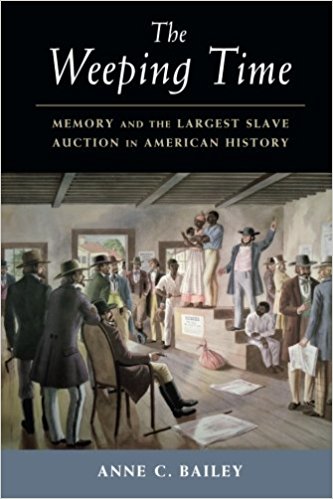 This week at In The Past Lane, the history podcast, we explore the story of the largest slave auction in American history when some 436 enslaved people were sold in a two-day auction in 1859. To the people sold and the people they left behind, it would forever be known as “the weeping time.” This wrenching event involved the Butler family, a prominent southern family with ties to the Founding, as well as a famous British actress and abolitionist, Fanny Kemble. And of course, it involved hundreds of enslaved people who were sold to pay the debts of Pierce Butler. To help us make sense of this event and the subsequent memory of it, I speak with historian Anne C. Bailey, author of The Weeping Time: Memory and the Largest Slave Auction in American History published by Cambridge University Press. She draws upon a rich set of primary source materials, including a detailed firsthand account written by a New York Tribune reporter posing as a buyer. Bailey also tracks the story of the people sold after the Civil War as they tried to reconstruct their families. She also interviews a number of the descendants of the people sold. The result is a remarkable examination of this extraordinary event and the wider story of slavery, slave auctions, and historical memory.
This week at In The Past Lane, the history podcast, we explore the story of the largest slave auction in American history when some 436 enslaved people were sold in a two-day auction in 1859. To the people sold and the people they left behind, it would forever be known as “the weeping time.” This wrenching event involved the Butler family, a prominent southern family with ties to the Founding, as well as a famous British actress and abolitionist, Fanny Kemble. And of course, it involved hundreds of enslaved people who were sold to pay the debts of Pierce Butler. To help us make sense of this event and the subsequent memory of it, I speak with historian Anne C. Bailey, author of The Weeping Time: Memory and the Largest Slave Auction in American History published by Cambridge University Press. She draws upon a rich set of primary source materials, including a detailed firsthand account written by a New York Tribune reporter posing as a buyer. Bailey also tracks the story of the people sold after the Civil War as they tried to reconstruct their families. She also interviews a number of the descendants of the people sold. The result is a remarkable examination of this extraordinary event and the wider story of slavery, slave auctions, and historical memory.
 More about:
More about:
Anne C. Bailey – website
Among the many things discussed in this episode:
What was “the weeping time,” the largest slave auction in US history?
How did auctions shape the lives of enslaved people?
What strategies did enslaved people deploy when faced with the auction block?
How the auction block loomed over the enslaved as an ever-present threat.
When the famed British actress and abolitionist Fanny Kemble married Pierce Butler, one of the nation’s largest slaveholders.
How freed people who were split up during slavery tried to reconstitute their families during Reconstruction.
Recommended reading:
Anne C. Bailey, The Weeping Time: Memory and the Largest Slave Auction in American History (Cambridge University Press, 2018).
Edward E. Baptist, The Half Has Never Been Told: Slavery and the Making of American Capitalism (2015)
Catherine Clinton, Fanny Kemble’s Civil Wars (2000)
Fanny Kemble, Journal of a Residence on a Georgian Plantation – 1838-1839.
Peter Kolchin, American Slavery: 1619-1877 (2003)
Music for This Episode
Jay Graham, ITPL Intro (JayGMusic.com)
Kevin McCleod, “Impact Moderato” (Free Music Archive)
Lee Rosevere, “Going Home” (Free Music Archive)
Andy Cohen, “Bathed in Finest Dust” (Free Music Archive)
Jon Luc Hefferman, “Winter Trek” (Free Music Archive)
The Bell, “I Am History” (Free Music Archive)
Production Credits
Executive Producer: Lulu Spencer
Associate Producer: Tyler Ferolito
Technical Advisors: Holly Hunt and Jesse Anderson
Podcasting Consultant: Darrell Darnell of Pro Podcast Solutions
Photographer: John Buckingham
Graphic Designer: Maggie Cellucci
Website by: ERI Design
Legal services: Tippecanoe and Tyler Too
Social Media management: The Pony Express
Risk Assessment: Little Big Horn Associates
Growth strategies: 54 40 or Fight
© In The Past Lane, 2018
